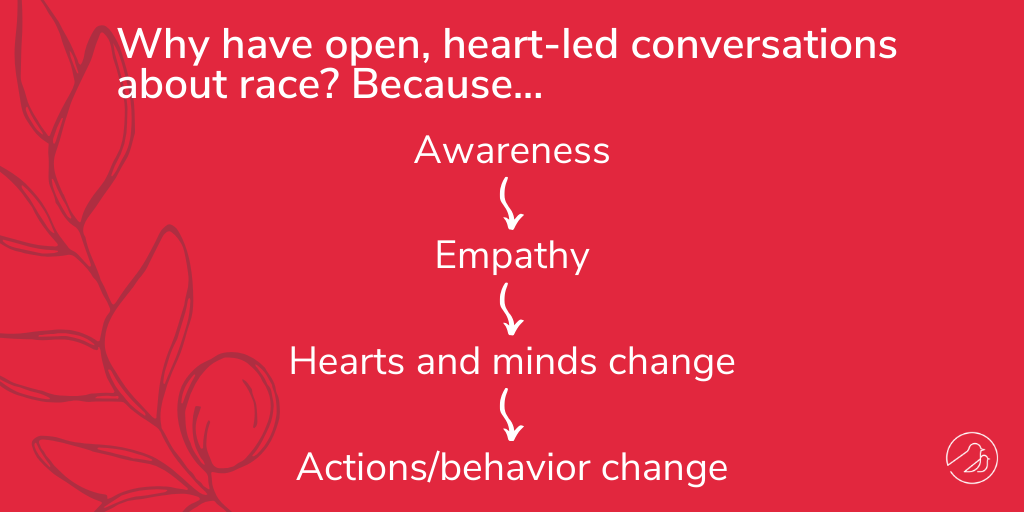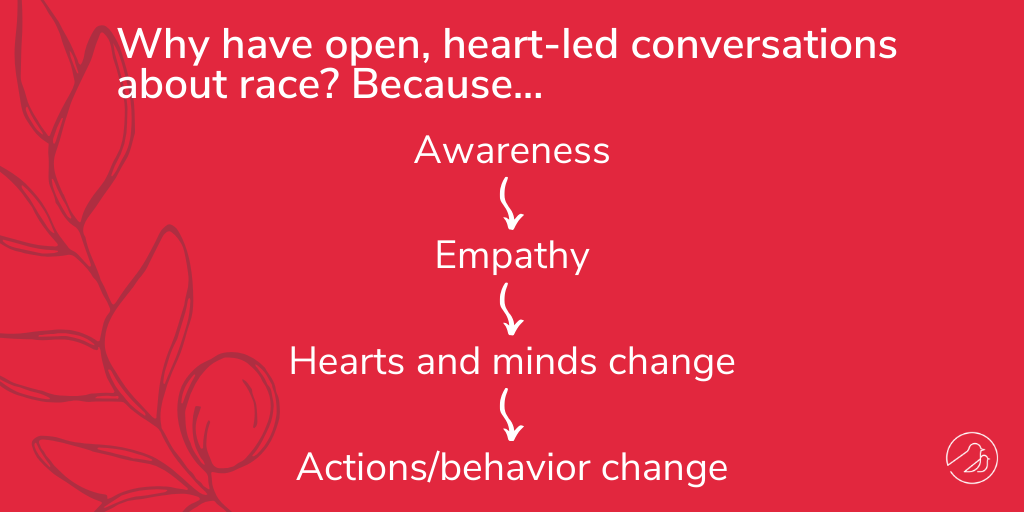
INTRODUCTION
Dialogue is an entry-point to move us into deeper understanding of one another and that can lead to deeper alignment. The goal of these conversations is to move people into awareness and consciousness with hopes that deeper understanding and empathy leads to a commitment to change thoughts and behaviors.
Awareness > Empathy > Hearts and minds change > Actions/Behavior change
Continued, open conversation can bring people into a racially just framework that acknowledges racism and its oppressive, disparate manifestations, and deadly outcomes that impact us all. Challenging the foundation of our viewpoints can be uncomfortable with unpredictable responses. It is important to acknowledge and sit with discomfort instead of rushing through it and ignoring it. Consciousness is an ongoing, never ending, lifelong process. This is a starting point.
GUIDELINES TO HOLDING DIALOGUE ON RACISM
- Be clear and open about the purpose of the conversation before inviting people and during the conversation
- Set ground rules for respectful conversation
- Active listening is a must
- Remain open, with curiosity modeled by responding with questions before responding with your own interpretation or explanation of impact in regards to someone else’s comments
- Recognize and acknowledge people’s experiences. The person/people you are in conversation with are bringing their own perspective, shaped by their own experiences (culture, history, practices, upbringing)
- Be mindful to take breaks to recenter when conversations feel uncomfortable or too wrought with conflict to be productive. Build in moments for deep breathing, pauses to reflect and recenter, and moments to be aware of mind, body, and emotional alignment
- Everyone has agency, and, regardless of agreement and alignment, everyone is worthy of being valued in the dignity of their humanity
- DON’T assume intent. DO center impact over intent
- Dismantling racism is not a checklist, a meeting, or a one-time commitment. Make small, realistic, challenging commitments to grow, learn and evolve.
MEET PEOPLE WHERE THEY ARE
Make no assumptions. People are bringing in different perspectives and experiences. Some things people may be sitting with could include:
- People won’t understand me;
- I don’t agree with everything and I don’t want to be judged;
- I have stupid questions;
- I’ve never had to think about this;
- I don’t want to offend anyone;
- This just doesn’t impact me like that;
- I don’t see race or color;
- I am not a racist and therefore play no part in racism.
WARM-UP
Talking about race and racism can be uncomfortable. Start with a warm-up activity or prompt aimed at getting people open and to set the environment for a safe conversation. Some questions to consider:
- How are you feeling about what’s happening in the world?
- What is your racial identity? Do you have privilege?
- How do you enter this conversation?
- Who do you hold in your heart and mind in reference to what’s happening?
SET CONTEXT
Bring people into the conversation by setting the context. Some questions to answer to set context:
- What is happening now that makes this important?
- Why is this conversation important?
- Why now?
DEFINE KEY TERMS
- Bias
- Caste
- Disparate impact
- Hierarchy
- Marginalized
- Race
- Racism
- Privilege
- Stereotypes
- Stigma
- Systemic racism
ASSESS WHERE PEOPLE ARE
Start with self-reflection. Introspective self reflection lets us see our past, understand mistakes, learn, and make changes. It is important to know where people are in their pursuit of racial understanding. Some key questions to ask and/or consider:
- Where are you in this moment?
- Reflect on your thoughts, feelings, and actions?.
- Do you think racism exists?
- Do you think racism exists in structural systems such as education, health care, jobs, etc.?
- Where do you think this country is on the journey to reaching racial equity?
GUIDING QUESTIONS:
- When were you first aware of your race?
- What do you remember from your childhood about how you made sense of human differences? If you have kids, is it different for them today than your own experience?
- How have external factors influenced your thinking about racial difference? Good or bad? People, things, media, etc.?
- How have stereotypes impacted your race framework?
- How has race showed up in your personal life? Career? And in care and caregiving?
- What feelings, thoughts, reflections are you holding in this moment? For yourself? Your family? Your community?
- What would it look like/feel like if things were good? If we were living in an accessible, non-racist, safe culture and world?
FOR ONGOING REFLECTION
What does the ongoing work look like?
- Donating to Black-led organizations
- Educate yourself and your loved ones by looking up resources on race, racism, white privilege, and oppression from Black writers.
- Here’s a place to start: Do The Work.
- Share those resources on social media
- Host difficult, uncomfortable, and heart-led conversations about anti-Black racism with your white friends, family, and community
- Sign petitions from organizations like Movement for Black Lives and Color of Change
- Focus locally and make calls or send emails to your school board, city council, mayor, and/or governor asking for concrete steps to ensure racial justice. This can include, but is not limited to: removing racist/Confederate statues, removing police presence from local schools, and investing resources in communities of color
- Listen with empathy and an open heart when people share their experiences of racism with you, rather than guilt or defensiveness
- Make food or bring water to deliver to protesters
- Use your privilege to advocate for Black caregivers and care recipients when you see racism being done in care settings
REFERENCES
READING
- Carla Bell: Leveraging White Privilege for Social Justice | Yes!
- Ibram X. Kendi: The Greatest White Privilege Is Life Itself | The Atlantic
- Courtney Martin: Answering White People’s Most Commonly Asked Questions about the Black Lives Matter Movement | The Bold Italic
- Hand in Hand: Connecting the dots: Anti-Black racism and domestic employment
- Ijeoma Oluo: Welcome to the Anti-Racism Movement, Here’s What You’ve Missed | The Establishment
- Jardana Peacock & Rachel Parsons: Anti-Racist Parenting During COVID-19 and Beyond | Yes!
- Rachel Wilkerson Miller: How to Talk to Relatives Who Care More About Looting Than Black Lives | VICE
VIDEOS
- Bryan Stevenson: There’s a Direct Line From Lynching to George Floyd | Amanpour and Company
- Ijeoma Oluo: Want To Have Better Conversations About Racism With Your Parents? Here’s How | NPR (audio)
- Jay Smooth: How I Learned to Stop Worrying and Love Talking About Race | TedX
OTHER THINGS TO RESEARCH TO DEEPEN ONE’S KNOWLEDGE
- Jim Crow
- New Jim Crow
- Juneteenth
- Voter suppression and Voting Rights Act
- 8toAbolition Demands
